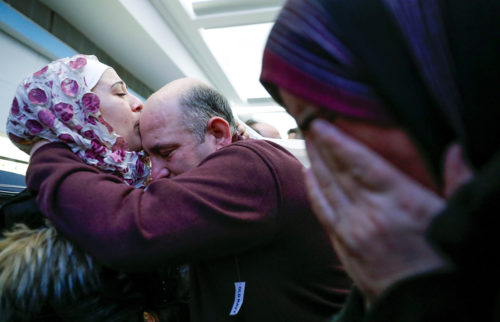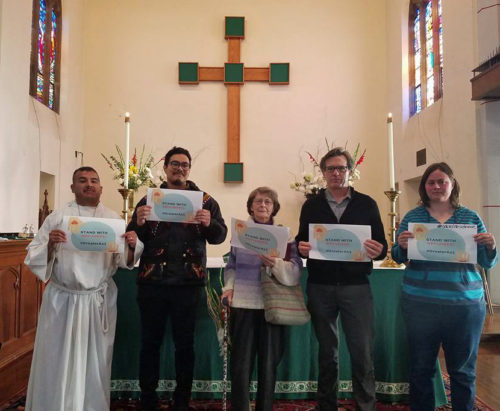Episcopal Migration Ministries, 8 other agencies awarded new contracts to resettle refugeesPosted Dec 3, 2018 |
|
[Episcopal News Service] The State Department, despite the Trump administration’s decision to drastically reduce the number of refugees allowed to be resettled in the United States, has renewed contracts with all nine agencies that long have facilitated resettlements for the government, including Episcopal Migration Ministries, or EMM.
The decision, communicated to the agencies on Nov. 30, allows them to continue their resettlement activities for another year, though at a greatly diminished capacity than under the Obama administration.
“We are thankful we will continue to resettle refugees in the coming year,” the Rev. Charles Robertson, canon to the presiding bishop for ministry beyond the Episcopal Church, said Dec. 3 in a press release announcing the State Department’s decision. “We still face the challenge of transitioning to a much smaller resettlement program. This, at a time when there are more than 25.4 million refugees, over half of whom are children. With everyone’s support, we will continue to welcome refugees to a place of safety and welcome.”

Syrian refugee Baraa Haj Khalaf, left, kisses her father, Khaled, as her mother, Fattoum, cries after arriving at O’Hare International Airport in Chicago in February 2017. Photo: Reuters
Robertson also invited Episcopalians to support this ministry financially by making a donation at episcopalmigrationministries.org/give or texting “EMM” to 41444.
The State Department announced Sept. 17 that it would lower the ceiling to only 30,000 refugees for the fiscal year that began Oct. 1, down from a ceiling of 85,000 just two years ago. And 30,000 is the upper limit. The actual number of refugees to be welcomed into the United States could be much lower.
EMM has resettled more than 90,000 refugees since the 1980s, providing a range of services for these families upon their arrival in the United States, including English language and cultural orientation classes, employment services, school enrollment and initial assistance with housing and transportation.
“We resettle refugees to reunite families, to save the lives of people with severe medical conditions, and to protect those fleeing religious persecution, among other protection needs,” said Lacy Broemel, refugee and immigration adviser with Episcopal Church’s Washington, D.C.-based Office of Government Relations. “As a church, we continue to advocate for higher refugee admissions numbers and for the U.S. to restore its global leadership in refugee protection and resettlement.”
The State Department’s final-hour announcement of its contract renewals – just a month before the current contracts expire – was greeted by church leaders as a positive short-term development after a period of tense uncertainty, but the renewals don’t alleviate long-term concerns about the future of the government’s resettlement program.
“We remain deeply concerned that the administration continues to dismantle the U.S. Refugee Admissions Program – a program that has been in place for decades with bipartisan – and broad public – support,” Broemel said by email. “By so drastically reducing the number of refugees who will be admitted to the U.S. each year, resettlement agencies will not be able to serve as many vulnerable people, and many communities around the country will no longer be able to carry out the life-giving work of refugee resettlement ministry.”
EMM once oversaw 31 resettlement affiliates in 26 dioceses, but that number has dwindled this year to 14 affiliates in 12 dioceses. The scope of EMM’s resettlement efforts in the coming year wasn’t immediately clear now that its contract has been renewed for the calendar year.
The agency has received strong churchwide support. Executive Council passed a resolution in October commending EMM, “whose dedicated staff, during a season of flux and uncertainty, have worked tirelessly and in a sacrificial manner to support refugees in many parts of the world who seek resettlement in the United States.”

Trinity Episcopal Church and Iglesia Episcopal de la Trinidad of Los Angeles pose with signs to show their support for immigrants and refugees. Their signs read “Stand with Refugees. #GreaterAs1.” Photo: Trinity Episcopal Church via Facebook
Presiding Bishop Michael Curry issued a statement of disappointment in September after the government announced the new cap on resettlements.
“Our hearts and our prayers are with those thousands of refugees who, due to this decision, will not be able to find new life in the United States,” Curry said. “This decision by the government does not reflect the care and compassion of Americans who welcome refugees in their communities every day. Our faith calls us to love God and love our neighbor, so we stand ready to help all those we can in any way we can.”
– David Paulsen is an editor and reporter for the Episcopal News Service. He can be reached at dpaulsen@episcopalchurch.org.

Social Menu